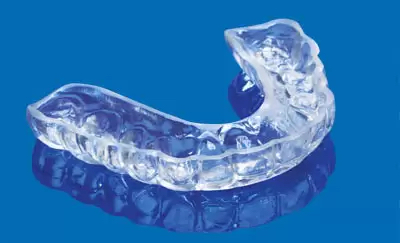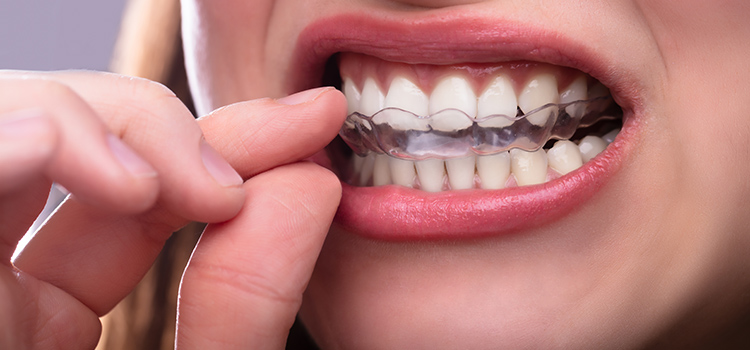
If you frequently wake up with a sore jaw, a dull headache or tooth pain, you may want to ask Dr. Roksar if you are suffering from a condition called bruxism. Bruxism, or teeth grinding. Everyone grinds their teeth, but the amount of grinding or clenching their teeth varies from person to person and day to day. In general when we are stressed, we tend to grind or clench or teeth.
There are several ways to alleviate the effects of bruxism. One of the most common, which Dr. Roksar may recommend, is a custom nightguard. This is an appliance typically worn while sleeping through the night. Dr. Roksar recommends custom made nightguard, which is made from a impression or mold of the teeth and is sent to a special dental laboratory. Dr. Roksar recommends custom made nightguard over store bought since, the custom nightguard is made of a higher quality and has a superior fit. The fit is critical in maintaining a balanced bite in order to prevent other occlusal issues. This is generally a more expensive device than one purchased over-the-counter, but can be more comfortable to wear.
Regardless of where a night guard is purchased, its main function is to prevent the surfaces of your teeth from grinding together, causing you to chip and crack your teeth and strain your jaw muscles.

Other Treatments for Teeth Grinding
If a nightguard is uncomfortable, there are other possible treatments listed below that you can ask your dentist about.
TMJ stands for temporomandibular joint. TMD stands for tempromandibular disease.
Your temporomandibular joint is a hinge that connects your jaw to the temporal bones of your skull, which are in front of each ear. It lets you move your jaw up and down and side to side, so you can talk, chew, and yawn. It is very similar to other joints of the such as the knees or elbows.
Problems with your jaw and the muscles in your face that control it are known as temporomandibular disorders (TMD). But you may hear it wrongly called TMJ, after the joint.
What Causes TMD?
We are not sure what causes TMD. Dentists believe symptoms arise from problems with the muscles of your jaw or with the parts of the joint itself.
Injury to your jaw, the joint, or the muscles of your head and neck — like from a heavy blow or whiplash — can lead to TMD. Other causes include:

What Are the Symptoms?
TMD often causes severe pain and discomfort. It can be temporary or last many years. It might affect one or both sides of your face. More women than men have it, and it’s most common among people between the ages of 20 and 40. Common symptoms include:
You may also have toothaches, headaches, neck aches, dizziness, earaches, hearing problems, upper shoulder pain, and ringing in the ears (tinnitus).
The simplest most common treatment is to get a mouthguard or occlusal splint such as an NTI-TSS

The NTI TSS (Nociceptive Trigeminal Inhibition Tension Suppression System) is a small plastic device that is originally designed to prevent headache and migraine caused by teeth clenching and grinding. The objective of the NTI is to relax the muscles involved in clenching and teeth grinding.
The NTI TSS device is an anterior bite stop, worn over the two front teeth at night to prevent contact of the canines and molars. It is fitted by a dentist trained in the technique, who can quickly customize such a device for a patient’s mouth.
The NTI TSS decreases the strength of tooth clenching by triggering a nerve reflex that relaxes the muscles, and at the same time prevents the molars from touching. It aids the user in stopping unconscious forceful clenching and biting, preventing common consequences such as worm out teeth, jaw pain and inflammation and tension headaches.
Our goal is to help every patient experience the benefits of good oral health and a beautiful smile. We value the trust you have placed in our office and strive to provide solutions that meet your dental needs and expectations of care.
Phone